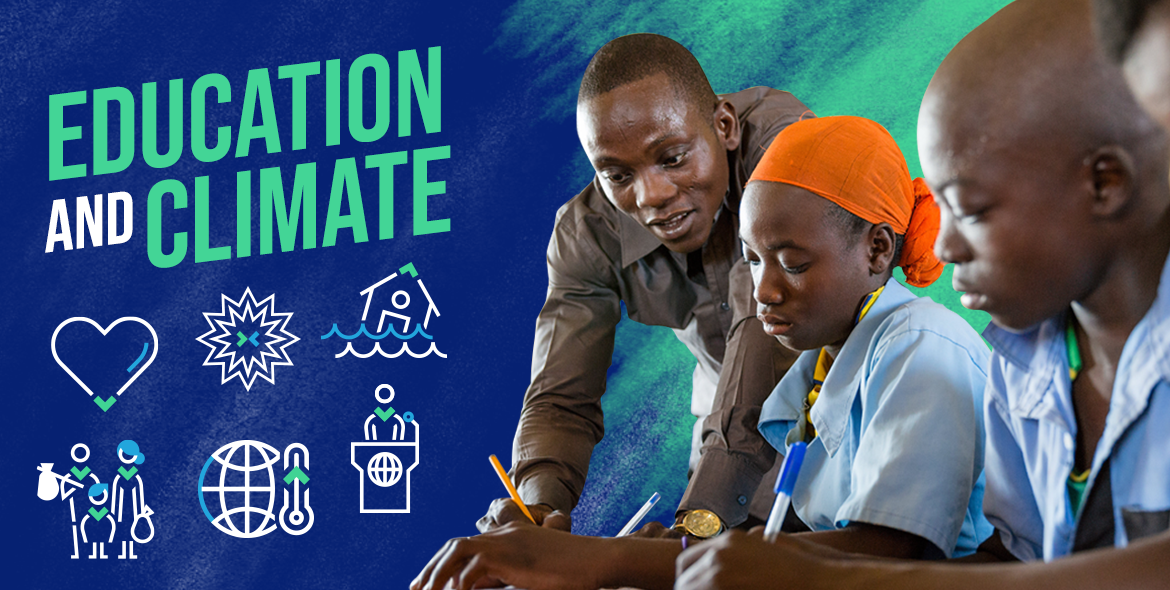By Sarah Beardmore, Strategic Partnerships and Capabilities Team Lead, Global Partnership for Education.
A year ago, an unlikely group gathered at Wilton Park under the auspices of the Foreign, Commonwealth and Development Office (FCDO), and Global Partnership for Education (GPE). Representatives from the education and climate change fields came together at a two-and-a-half-day conference with the aim to prepare education systems to better withstand climate change impacts and develop climate-smart populations by mobilizing cross-sector partnerships behind a common framework for climate action in and through education.
The meeting “Learning Climate: Forging shared solutions on education, environment and climate change” brought together 47 experts from various sectors, including youth mobilization, disaster risk reduction, green and resilient infrastructure, school safety, climate curriculum, and climate adaptation funds. The discussion covered a range of issues, building from a discussion on what the current needs and efforts are in partner countries, to what a climate-smart system would look like, and formulating an agenda for action. Three days of engaging discussions were the seed of an agenda that has grown and is showcasing results and a robust path forward.
From discussion to knowledge generation
The first tangible result coming out of the meeting was the development of the Climate Smart Education System Framework. Developed by Sustainability Frontiers and GPE, the report builds on discussions and analyses from the Wilton Park gathering and highlights key entry points to strengthen climate resilience and action across seven dimensions of an education system. The framework was peer-reviewed by many of the Wilton Park participants and formally launched this past April at an event at Brookings Institute, highlighting concrete good practice examples from lower income countries that are bearing the greatest impact of climate change and environmental degradation.
During the Wilton Park event, the FCDO’s Colin Bangay (Senior Education and Climate Adviser) committed to help build and disseminate knowledge around climate change, environment and education, and subsequently curated a blog series on climate change with articles by many Wilton Park participants including Leonora Macewen, Camilla Fossberg, Desmond Bermingham, Catriona Forbes, Katharine Vincent, Fumiyo Kagawa, among others. Connected to this agenda, the UK released a new position paper on Girls Education, Climate and Environmental Change, which also builds on some of the discussions from the meeting.
From knowledge generation to action
In partnership with Wilton Park participants, Save the Children, and UNESCO, GPE launched a new Climate Smart Education System Initiative in early 2023, which provides technical assistance to the ministries of education to assess and address capacity gaps in policy, data, cross-sectoral coordination, finance, and pedagogy. This initiative started piloting in Zimbabwe and Malawi and is preparing to scale to an additional 20 countries with $15 million approved by the GPE Board in June this year. Both pilot countries took part in the Wilton Park convening and had a critical role in shaping this agenda based on their own country’s experiences and needs. In the words of Minister of Education Agnes Makonda Ridley, representing Malawi, “for low-income countries in the global south, climate change comes like a thief in the night.”
A recent scoping mission to Malawi and Zimbabwe highlighted the noteworthy progress of both countries in addressing the impacts of climate change on their education systems, but also demonstrated the acute need for coordinated action to advance climate smart education systems. Cyclone Freddy’s impact on education was still evident from the camps of displaced people living in school buildings in southern districts of Malawi while classes were suspended indefinitely. From enhancing school disaster management approaches to integrating environmental sustainability into all levels of education, countries participating in this initiative will be able to pinpoint and prioritize the dimensions of the system they would like to focus on.
Climate finance in education
Another important avenue of exploration at Wilton Park focused on the importance of ensuring climate finance is effectively leveraging the role of education systems for climate action. Jerry Velasquez from the Green Climate Fund (GCF) joined the meeting virtually and clearly outlined the potential for education adaptation efforts to draw on GCF finance, provided the climate drivers of vulnerability are evidenced and addressed in proposals. From the risks climate change poses to the delivery of quality education to the role of education to build capacity to respond to the effects of climate change, this conversation opened the doors to exploring further opportunities in this field. Since the Wilton Park event, GPE is working with the Green Climate Fund to identify potential countries which are eligible for both GPE grants and GCF finance, so that common grant agents such as Save the Children can build a pipeline of proposals for climate adaptation in education. There is clearly a strong need, and the Climate Smart Education System Initiative is well-positioned to support country’s readiness to access climate finance.
With strong partnerships forged at Wilton Park and a growing momentum to ensure all education systems around the world are prepared for the challenges of the 21st century, the learning climate event catalyzed a year of unprecedented progress in support of countries at the frontlines of the climate emergency. Looking forward, there is now a solid foundation for an ambitious agenda on education in wider climate negotiations and strategies, including at the upcoming COP28 hosted by the United Arab Emirates where education will feature as a prominent theme.
